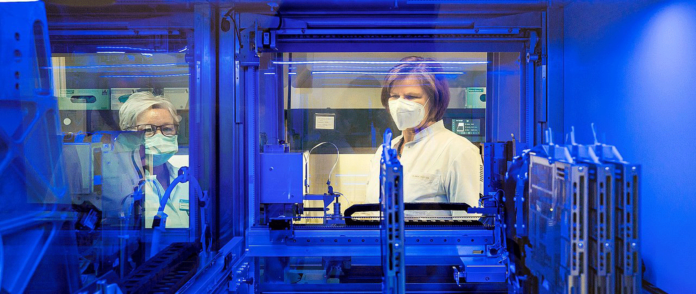COVID-19 vaccines are proven partial success. They do not protect everyone who is vaccinated.
In collaboration with Bavarian Research Foundation, scientists at the Technical University of Munich have developed a protein that can prevent infection by the virus and its variants.
Many glycosylated S proteins cover the surface of SARS-CoV-2 and bind to the host cell receptor angiotensin-converting enzyme 2 (ACE2), mediating viral cell entry. Anti-SARS-CoV-2 Monoclonal Antibodies are being used to treat mild to moderate COVID-19.
Although, the virus uses mutation to evade attacks by therapeutic antibodies and, in part, also the natural antibodies formed after vaccination.
Scientists, in this study, used a different strategy. They created an active ingredient by combining the ACE2 protein with a human antibody protein immunoglobulin G (IgG). The resulting fusion protein, dubbed FYB207, was protective against SARS-CoV-2.
In cell tests, this new fusion protein shows promising pharmaceutical properties.
Johannes Buchner, Professor of Biotechnology at the Department of Chemistry of the Technical University of Munich in Garching, said, “As the virus needs optimum docking on the ACE2 protein to survive, the virus cannot evade a medication which is based on exactly this protein. The fusion protein will therefore also be reliably effective against future mutations.”
“FYB207 can potentially be administered against all Coronavirus types which use ACE2 as a docking point – not only against variants of the current SARS-CoV-2 virus. ACE2 also has a natural enzyme activity in the cardiovascular system which could offer additional protection against the threat of organ failure for the lungs, heart, and kidneys.”
Dr. Carsten Brockmeyer, a co-author of the study and CEO of Formycon AG, said, “The fusion protein can be easily created biotechnologically. In the context of the partnership, we also made sure that the selected active ingredient variants have pharmacologically favorable properties. We hope to be able, to begin with, the first clinical studies in the first half of the upcoming year.”
Prof. Ulrike Protzer said, “The SARS-CoV-2 virus and its related variants will continue to accompany humanity in the future. Even if vaccination is a highly reliable way to prevent severe symptoms in the illness, the significantly more contagious Delta and Omicron variants have shown that both recovered and vaccinated patients can be re-infected. With regard to future, possibly even more contagious variants, we need a broadly efficacious active ingredient against the virus in addition to vaccination.”
Journal Reference:
- Hristo L. Svilenov, Julia Sacherl et al. Picomolar inhibition of SARS-CoV-2 variants of concern by an engineered ACE2-IgG4-Fc fusion protein. DOI: 10.1016/j.antiviral.2021.105197
